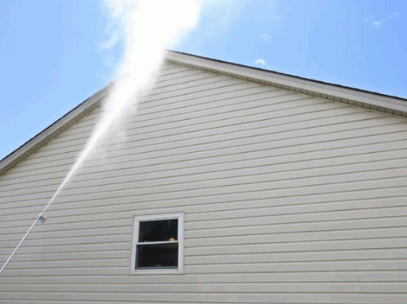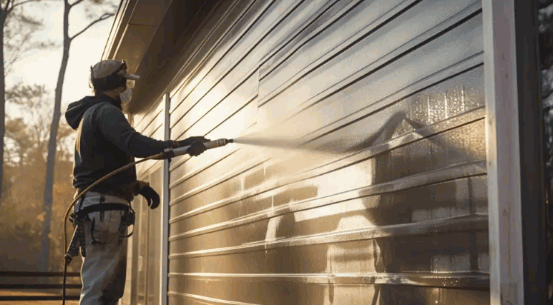
Pressure washing is an effective cleaning method that many homeowners use to maintain the appearance and integrity of their vinyl siding. This cleaning method involves the use of a pressure washer, which is a vital tool in home maintenance routines.
It offers numerous benefits, including removing dirt, enhancing curb appeal, and preventing damage, but it's essential to understand the risks involved and how to do it safely. Proper cleaning steps and the right detergent nozzle are crucial for achieving the best results.
This guide explores what pressure washing entails, the advantages and potential hazards, and practical tips for safely cleaning your vinyl siding without causing damage. It will also cover essential cleaning tools and proper cleaning techniques.
Whether you’re considering a DIY approach or hiring a professional, this information will help you make informed decisions for your home. Understanding cleaning frequency and the importance of cleaning effectiveness will ensure you maintain your home properly.
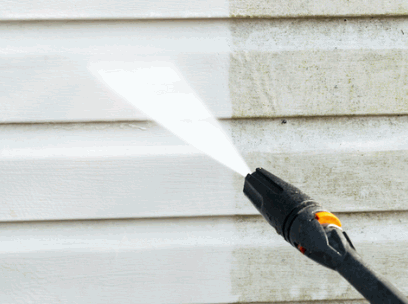
Table of Contents
Jet washing, also known as pressure washing, is an effective outdoor cleaning method that utilises high-pressure water to remove dirt, grime, mould, mildew, and other unsightly stains from various surfaces.
This technique is particularly beneficial for maintaining the cleanliness and aesthetics of your home, as it can restore the original condition of exterior walls, driveways, patios, and outdoor furniture.
By employing specialised cleaning solutions and equipment, homeowners can achieve superior cleaning effectiveness while preventing potential water damage that could compromise their property’s integrity.
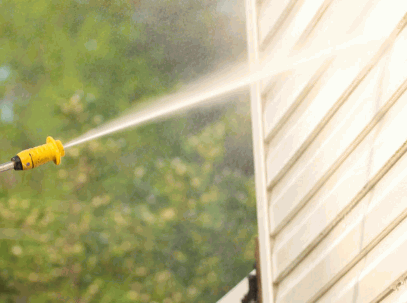
Pressure washing offers a multitude of benefits that enhance both the appearance and longevity of your home, making it an essential part of regular home improvement and exterior maintenance.
By effectively removing dirt and grime, pressure washing can significantly increase kerb appeal, providing a fresh and welcoming look to your property. Moreover, it plays a crucial role in mildew and mould removal, which can otherwise lead to more severe water damage and costly repairs if left untreated. Utilising the right cleaning solutions and following proper cleaning instructions are key to preventing these issues.
One of the primary advantages of pressure washing is its exceptional ability to remove dirt and grime from a variety of surfaces, including vinyl cladding, driveways, and patios, restoring them to their original condition.
This potent cleaning method utilises high-pressure water jets combined with specialised detergents to tackle stubborn stains, grease, and other contaminants that accumulate over time.
Various cleaning solutions are designed for specific surfaces; for example, deck cleaners can help rejuvenate wooden materials, while concrete cleaners work effectively on driveways. Additionally, using a vinegar solution or a bleach mixture can help with stubborn stains. The importance of cleaning effectiveness in pressure washing cannot be overstated, as it not only enhances the appearance of the surfaces but also prolongs their lifespan.
By understanding how to utilise pressure washing effectively, property owners can maintain the aesthetic appeal and integrity of their outdoor spaces. Knowing the correct nozzle distance and proper cleaning mixtures can greatly enhance the cleaning results.
Increasing kerb appeal is another significant benefit of pressure washing, as a clean exterior not only enhances the aesthetic value of a home but can also positively impact its market value and attractiveness to potential buyers. This is especially true for vinyl restoration projects.
When homeowners invest in pressure washing, they are not just removing dirt and grime; they are revitalising the entire look of their property. A fresh, spotless exterior can make all the difference in how a home is perceived. For example, clean cladding can effortlessly transform the appearance of a house while ensuring that mould and mildew are kept at bay, protecting the integrity of the exterior. Additionally, using proper cleaning solutions can further enhance the results.
Similarly, pressure washing driveways can eliminate unsightly stains and marks, making a striking first impression. This thorough cleaning method helps maintain the condition of outdoor surfaces and reveals the original finishes that might have been hidden beneath layers of dirt.
Ultimately, by embracing outdoor cleaning practices like pressure washing and soft wash systems, homeowners not only improve their living environment but also position themselves favourably in a competitive real estate market.
Regular pressure washing plays a crucial role in preventing damage to cladding, particularly vinyl cladding, by effectively removing mildew and mould that can deteriorate surfaces over time and lead to costly repairs. Ensuring proper cleaning precautions and using the right cleaning equipment further aids in this process.
Neglecting to carry out this essential maintenance can result in significant long-term consequences, as the accumulation of dirt and organic matter can compromise the integrity of the cladding. Engaging in regular exterior cleaning and following home guidelines can help prevent these issues. Failure to address these issues promptly can lead to extensive repairs, resulting in unexpected expenses.
Without intervention, the growth of mildew can penetrate the vinyl, causing discolouration and even warping. Seasonal cleaning and the use of mildew removal techniques are essential to prevent such damage.
By investing time in proper upkeep, homeowners can avert severe issues, extend the lifespan of their cladding, and keep their property looking pristine.
Pressure washing significantly saves time and effort compared to traditional cleaning methods, allowing homeowners to easily tackle large areas with powerful cleaning tools that deliver impressive results in a fraction of the time. This method of home upkeep is essential for maintaining a clean and welcoming environment.
Regarding home maintenance, the advantages of pressure washing extend far beyond simple efficiency. In today’s fast-paced world, who has the luxury of spending hours scrubbing surfaces manually when a pressurized water stream can cut through grime quickly? Utilising the right cleaning recommendations can further optimise this process.
Consider the following benefits:
This approach also minimizes the need for frequent cleaning, making it an essential part of seasonal cleaning routines. Ultimately, choosing pressure washing not only transforms the appearance of your property but also offers a wise allocation of your time and energy.
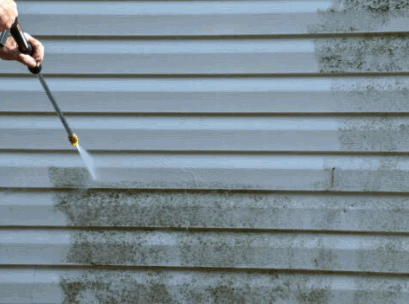
While pressure washing is an effective cleaning method, it is not without its risks, which can include potential damage to cladding or property if the technique is not applied correctly, as well as health risks associated with the chemicals used in certain cleaning solutions. Understanding power washer safety and following cleaning safety guidelines can mitigate these risks.
Proper training and awareness of safety precautions are essential to mitigate these risks.
Improper pressure washing techniques can lead to serious damage to cladding or other exterior surfaces, particularly if high pressure is used on delicate materials without appropriate cleaning precautions. Using the correct pressure settings and following recommended cleaning instructions are crucial for damage control.
This can result in a variety of issues that not only detract from the aesthetic appeal but can also incur significant repair costs. For instance, using excessive pressure can strip paint off wooden surfaces, leaving them exposed and vulnerable to environmental elements. When the wrong nozzle or technique is applied, there's a risk of damaging the underlying material, which might necessitate extensive repairs. Employing a proper rinse solution can help mitigate these risks.
To mitigate these risks, it is essential to follow specific cleaning precautions and utilise the proper pressure settings suited to the surface being cleaned. Performing a test patch in an inconspicuous area can provide valuable insight into how the material will react. Additionally, consulting with professional cleaning services can provide expert guidance.
Take a look: How To Clean Window Sills
When using certain cleaning solutions for pressure washing, there can be health risks associated with chemical exposure, making it vital to wear appropriate safety gear and follow all safety instructions. Home guidelines often recommend the use of gloves, goggles, and masks for added protection.
The importance of utilising non-toxic cleaning solutions cannot be overstated, as they significantly mitigate health risks while ensuring effective cleaning outcomes. By opting for eco-friendly products, one not only protects personal health but also contributes to a healthier environment for others. Brands like Mi-T-M offer a range of eco-friendly solutions suitable for various cleaning needs.
It's essential to understand that these adverse effects can range from respiratory problems to skin irritations. Therefore, using adequate safety gear like gloves, goggles, and masks is a crucial step in the cleaning process. By prioritising safety and making informed choices about cleaning solutions, individuals can avoid unnecessary health risks and ensure a safer work environment. Proper disposal of hazardous materials and maintaining good ventilation are also important cleaning safety measures.
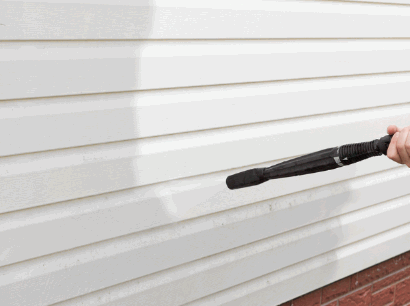
To safely pressure wash vinyl cladding, it is essential to follow specific cleaning instructions that ensure both the integrity of the cladding and the effectiveness of the cleaning process, including the use of appropriate pressure settings and cleaning methods. This will help maximise the cleaning power and efficiency of the process.
Proper preparation, including wearing safety equipment and assessing the condition of the cladding, is crucial to achieving optimal results without causing damage. Consider using a garden hose for initial rinsing to remove loose debris before pressure washing.
Choosing the right pressure and nozzle is vital for effective pressure washing, as different surfaces require specific pressure settings and nozzle distances to avoid damage while maximising cleaning effectiveness. This ensures efficient surface cleaning and dirt removal without harming the surfaces.
When tackling various surfaces, such as wood, concrete, or delicate materials like stucco, cleaning efficiently rests on making smart choices regarding both pressure levels and the appropriate nozzle. The key is understanding that each surface has unique characteristics that influence how it responds to pressure washing, ensuring effective cleaning of surfaces without causing damage.
For instance, lighter surfaces might require lower pressure, whereas tougher surfaces like concrete can handle higher settings. It’s also important to select nozzles carefully – wider spray patterns may work best for larger areas, while concentrated nozzles can target stubborn stains effectively.
By tailoring the pressure settings and nozzles based on the surface type, one can achieve optimal cleaning results while safeguarding the integrity of the materials being cleaned.
Using a mild cleaning solution, such as a vinegar solution or a soft wash system, can enhance the cleaning process while effectively addressing mildew removal without damaging the vinyl cladding. Incorporating a powdered cleaner can also be beneficial for more stubborn stains.
By opting for non-toxic cleaning solutions, homeowners can ensure a safer environment for their families and pets while still tackling stubborn grime. One effective method is to mix a solution of distilled white vinegar and water, usually in a 1:1 ratio, which not only removes mildew but also leaves the vinyl cladding looking fresh and vibrant. The gentle acidity of vinegar is perfect for cutting through dirt without causing harm.
This natural approach not only preserves the integrity of the vinyl but also contributes to an environmentally friendly household. For a professional touch, consider hiring home services.
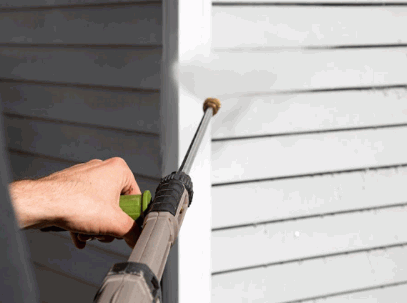
When pressure washing, it is essential to protect nearby plants and objects from potential damage caused by high-pressure water and cleaning solutions, implementing measures to ensure safe outdoor cleaning. You may also come across insect nests or mold during the cleaning process, so take precautions to handle these appropriately.
One of the most effective ways to achieve protection is by carefully assessing the area before you begin the cleaning process. It is important to identify vulnerable items, especially delicate plants or outdoor furniture that could be easily harmed.
To safeguard these elements, you might consider the following tips:
By implementing these protective methods, not only will the aesthetics of your outdoor space be maintained, but you will also avoid unnecessary repairs and replacement costs.
When pressure washing, it is advisable to work from the bottom up to prevent streaks and ensure that the rinse solution effectively washes away residue, maximising the cleaning method's efficacy.
This approach is particularly beneficial because it allows the cleaner to avoid pushing dirt and grime downwards, which can lead to unsightly streaks on surfaces. Starting at the bottom means that heavier contaminants will be lifted up and can be rinsed away, ensuring a more thorough clean.
Here are some important steps to consider when using this technique:
By following these steps, one can coordinate their movements strategically, ensuring that each section is attended to properly for optimal results.
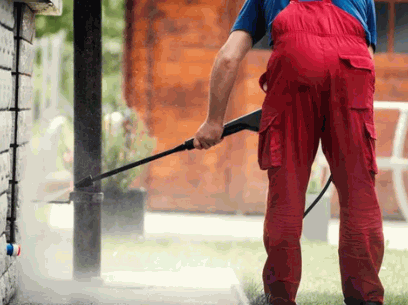
Yes, pressure washing can damage vinyl cladding if not performed with the appropriate care, particularly if the pressure is set too high or if improper cleaning techniques are employed without adequate damage control precautions.
When engaging in this type of cleaning, it is crucial to consider several factors that could lead to detrimental effects on the cladding's surface and overall integrity. First and foremost, using a pressure washer with excessive PSI can cause the vinyl to warp or even shatter, leading to expensive repairs. Failing to maintain a proper distance from the surface while washing can exacerbate these risks.
It is advisable to:
By taking these precautions, one can minimise the potential for damage and ensure that the vinyl cladding remains in excellent condition for years to come.
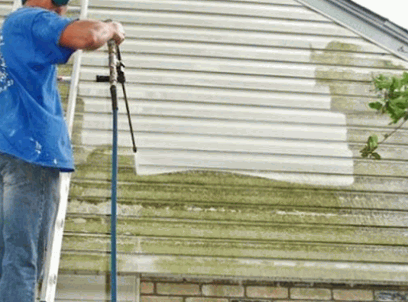
When executed correctly, pressure washing is safe for vinyl cladding and can effectively remove dirt and grime, provided that the user adheres to safety recommendations and employs the right techniques.
One of the key aspects of ensuring safety while cleaning is the use of appropriate safety equipment. This includes protective eyewear, gloves, and possibly a mask to prevent inhalation of any cleaning agents or debris. The pressure washer should be set at a safe distance, typically 60 to 90 centimetres away from the cladding, with the nozzle angled appropriately to avoid damage.
Always follow the manufacturer’s guidelines for both the pressure washer and the cleaning products to achieve optimal results.
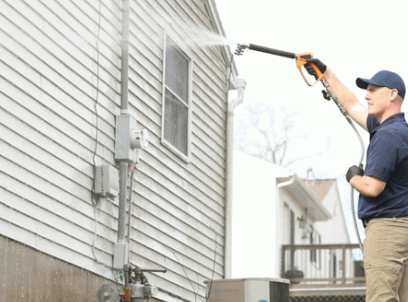
Vinyl cladding should ideally be pressure washed every one to two years, depending on the environmental factors, to maintain its appearance and longevity, ensuring regular home maintenance and protection against mould and mildew accumulation. Applying an acrylic primer afterward can provide additional protection against environmental elements.
Several variables significantly influence this cleaning frequency, including geographic location, which determines exposure to elements like rain, sun, and wind. For instance, homes situated in humid areas may require more frequent cleanings to prevent mould and mildew growth. Weather conditions also play a vital role; regions with heavy pollen or dust can lead to accumulation that necessitates sooner washing. Homeowners should consider their surrounding environment, such as nearby trees that might shed leaves or sap, prompting the need for regular outdoor cleaning to maintain the cladding's aesthetics.
By recognising these factors, individuals can better schedule cleanings, ensuring their cladding remains in pristine condition throughout the seasons.
